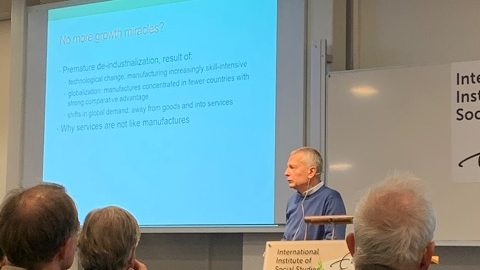In the picture, Dani Rodrik
By Tereza Neuwirthova.
On Thursday 7th November, the International Institute of Social Studies in The Hague hosted a lecture by Dani Rodrik, a Harvard professor of International Political Economy who is receiving an Honorary Doctorate from the Erasmus University Rotterdam on 8th November during the celebration of the Dies Natalis of the university.
During his lecture, professor Rodrik presented an argument about the economic growth that the world has experienced over the last century, whereby he stressed that the miracle which was commonly found and stood behind the convergence of the inequalities between developed and developing countries was a rapid industrialisation, especially such that is oriented to manufacturing exportable products.
By showing the experiences of “economic growth miracles”, in other words the countries that have experienced a constant GDP growth over the past 20 years such as China, South Korea, Singapore, or Japan, Mr. Rodrik demonstrated how the structural change of industrialisation enables for expansion.

Moreover, two cases of recent high growth miracles -India and Ethiopia- were scrutinised. These instances are remarkable since they are not following the traditional industry-led mechanism, and conversely pursuing the development of modern sectors, which according to Mr. Rodrik might prove to be self-limiting and unsustainable in the long-term.
Lastly, by showing the developments in today’s economies, as well as the external factors such as shifts in consumer demand, globalisation, off-shoring, and technological change, Mr. Rodrik explained how the current path leading to premature de-industrialisation. Having pointed to this relation, the professor drew a conclusion that this mechanism of an industry-led economic development will no longer be applicable in the future.
With the attendance of numerous diplomats, employees of ministries, as well as professors and researchers from many Dutch universities, the lecture by Mr. Rodrik marked an interesting and worthwhile afternoon.



